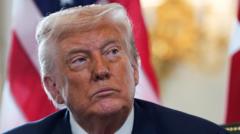Is Trump Targeting London's Mayor Again?

Understanding the Tensions Between Donald Trump and Sadiq Khan
The relationship between political figures can often be tumultuous, especially when they come from different countries and have opposing ideologies. A prime example of this is the ongoing feud between former President Donald Trump and the Mayor of London, Sadiq Khan. Their contentious exchanges have captured public attention and fueled discussions about leadership, governance, and international relations. In this article, we will explore the background of their rivalry, its implications, and what it reveals about current political climates in both the United States and the UK.
The Origins of the Conflict
The conflict between Trump and Khan dates back to 2016 when Trump was campaigning for the presidency. Khan, a member of the Labour Party, openly criticized Trump’s proposed policies, particularly those targeting Muslim communities. This criticism did not go unnoticed; Trump responded with a series of derogatory comments about Khan, which set the stage for an ongoing verbal sparring match.
In 2019, the tensions escalated when Trump referred to Khan as a “stone cold loser” who needed to focus on crime in London. This remark came shortly after Trump’s arrival in the UK for a state visit. Khan had previously condemned Trump’s views and actions, particularly those seen as inflammatory towards minorities. Trump's remarks were widely reported and added fuel to the fire of their already strained relationship.
Recent Developments
Fast forward to 2023, and the feud remains alive. During a press conference in Scotland, Trump did not hold back when discussing Khan, labeling him “a nasty person” and claiming he had “done a terrible job.” These comments were made in the context of Trump’s visit to his golf courses in Scotland, which he described as a private trip, although the political undertones were evident. Sitting beside Prime Minister Sir Keir Starmer, who defended Khan, Trump continued to voice his disdain, showcasing the contentious dynamic between the leaders.
Khan’s spokesperson responded to Trump’s latest remarks by emphasizing the positive aspects of London, particularly its diversity. They noted that many Americans have sought British citizenship during Trump's presidency, suggesting that his negative comments might not reflect the sentiments of all Americans. This response highlights Khan’s focus on promoting London as a global city that thrives on its multiculturalism.
Implications for International Relations
The ongoing rivalry between Trump and Khan raises questions about the impact of personal relationships on international diplomacy. While the United States and the United Kingdom have historically enjoyed a “special relationship,” such public disputes can create rifts that affect bilateral cooperation. The personal animosity displayed by Trump may overshadow more significant discussions related to trade, security, and shared challenges.
Leaders often have to navigate complex personal dynamics while still maintaining a focus on policy. The ability to separate personal feelings from professional responsibilities can lead to more productive diplomatic engagements. However, when leaders publicly attack one another, it risks undermining collaborative efforts and may lead to a more polarized political climate.
The Role of Social Media in Political Conflicts
Social media has revolutionized the way political leaders communicate, and its role in the Trump-Khan saga cannot be understated. Trump's frequent use of Twitter to voice his opinions has made it easier for him to reach a global audience but also has led to increased scrutiny and backlash. Khan has also utilized social media to counter Trump's claims and promote his narrative, creating a digital battleground that extends beyond traditional political discourse.
In today's political landscape, social media platforms serve as both tools for communication and arenas for conflict. The immediacy of these platforms allows leaders to respond quickly, often resulting in exchanges that can escalate tensions. This dynamic highlights the need for responsible communication in politics, where the stakes are high, and the public is watching closely.
Public Perception and Reaction
The public's reaction to the feud between Trump and Khan has been mixed. Supporters of Trump often align with his criticisms of Khan, citing concerns about crime and governance in London. Conversely, Khan’s supporters view Trump’s comments as an attack on London’s values, including its commitment to diversity and inclusion. This divide in public perception reflects broader political divisions in both countries and illustrates how local issues can become part of international discourse.
Polling data often reveals a significant gap in approval ratings for both leaders among various demographic groups. Factors such as political affiliation, age, and geographic location play critical roles in shaping opinions about their respective leadership styles and effectiveness. Understanding these nuances is essential for grasping the complexities of their ongoing conflict.
Looking Ahead: The Future of Trump and Khan's Relationship
As both leaders continue to navigate their political landscapes, it remains to be seen how their relationship will evolve. Trump is set to make a formal state visit to the UK later this year, which could provide an opportunity for both leaders to address their differences. However, given their history, it is likely that tensions will remain high, and their public interactions could continue to attract media attention.
Moreover, the political climate in both the US and UK is constantly changing. The upcoming elections and shifting party dynamics may influence how Trump and Khan approach their relationship in the future. Leaders constantly keep an eye on public sentiment, and as issues evolve, so too may their strategies for engagement or confrontation.
Conclusion
The ongoing feud between Donald Trump and Sadiq Khan serves as a case study in modern political conflict. Their exchanges highlight the interplay between personal animosity and public policy, as well as the broader implications for international relations. As the world becomes increasingly interconnected, the actions and words of leaders carry weight far beyond their borders.
As we look ahead, it is crucial for leaders to prioritize diplomatic dialogue over personal attacks. The future of international relations may depend on their ability to set aside differences and work together for the common good. How do you think the relationship between leaders impacts global cooperation? #Politics #InternationalRelations #Leadership
FAQs
What sparked the conflict between Trump and Khan?
The conflict began in 2016 when Sadiq Khan criticized Trump's policies targeting Muslim communities, leading to a series of derogatory comments from Trump.
How have social media platforms influenced their rivalry?
Social media has allowed both leaders to communicate quickly and publicly, escalating their exchanges and drawing global attention to their feud.
What are the potential consequences of their ongoing conflict?
The personal animosity between Trump and Khan may overshadow important diplomatic discussions and lead to a more polarized political climate in both nations.
Published: 2025-07-28 15:21:06 | Category: technology



